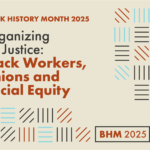
To mark December 6, the National Day of Remembrance and Action on Violence Against Women, Canada’s unions are calling on the federal, provincial and territorial governments to follow Manitoba’s lead by ensuring paid employment leave for victims of domestic violence.
In March, the Province of Manitoba enacted Bill 8, which amended their employment standards to afford workers who are victims of domestic violence with eligibility for five days of paid, protected employment leave (and additional unpaid time) if they need time away from work – whether it is to access medical attention or counselling, seek legal or law enforcement assistance, relocate, or obtain services from victim services organizations.
“This kind of leave is potentially life-saving,” said CLC Secretary-Treasurer Barb Byers, “Someone leaving a violent relationship shouldn’t have to fear losing their job or basic income.”
Paid safe time, or domestic violence leave, is well established in collective agreements in Australia and in legislation in several US jurisdictions. Ontario’s legislature is currently considering a private member’s bill that would grant 10 days paid leave to victims of domestic or sexual violence.
Canadian work on this issue started three years ago, when the Canadian Labour Congress partnered with researchers at the University of Western Ontario on a ground-breaking national study. The research found that one in three workers has experienced domestic violence, and the violence often follows people to work, putting safety and jobs at risk.
Since then, unions across the country have been working to negotiate domestic violence supports into collective agreements, and change legislation to support non-union workers who face domestic violence. For example, in 2012, unions and community allies were successful in getting the Ontario government to amend their Occupational Health and Safety Act to name domestic violence as a form of workplace violence.
Now, unions are urging other governments to follow Ontario’s example, updating health and safety legislation to ensure it recognizes the impact domestic violence has on workplaces, and encourages employers to protect workers from domestic violence at work.
In these efforts, the Canadian Labour Congress is connecting with provincial and territorial federations of labour to coordinate their work, such as by drafting joint letters to governments urging action.
In 2017, the Canadian Labour Congress will be taking additional steps to tackle domestic violence in the workplace, in Canada and abroad.
Here at home, the CLC will be rolling out a series of workshops designed to equip union representatives and leaders with tools to respond to domestic violence at work and refer workers to appropriate work and community support.
“We are working to implement a vision where we have hundreds of union members across the country working to address domestic violence at work at individual and systemic levels,” Byers said.
The CLC, together with Western University’s researcher partners, has also established an international Domestic Violence at Work Network, which includes unions, employers, governments, researchers, service providers and other experts. Network members share information, identify promising practices, and support efforts to expand awareness and action on domestic violence at work across the globe.
Right now, a key focus for the Network is achieving an International Labour Organization (ILO) Convention and Recommendation on Violence and Harassment. There is currently no internationally agreed-upon law that deals with the many different forms of gender-based violence in the workplace, whether it be sexual or psychological harassment, domestic violence at work, physical or sexual violence, or bullying.”
“An ILO convention like this would give workers voice to stand up against gender-based violence in the workplace, and it would send a strong message that violence is not part of the job,” Byers concluded.
For more information and resources, visit our Domestic Violence at Work resource centre: domesticviolenceatwork.ca.





